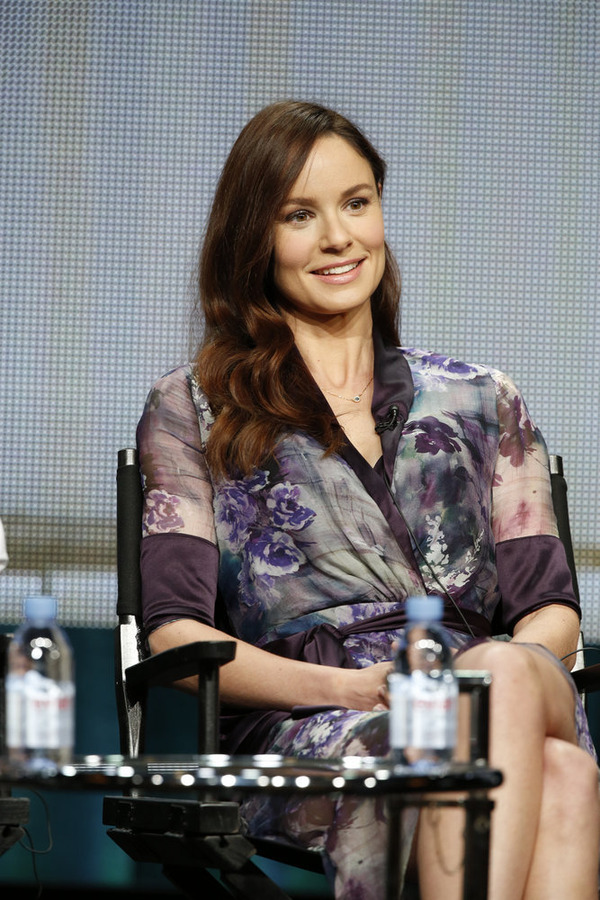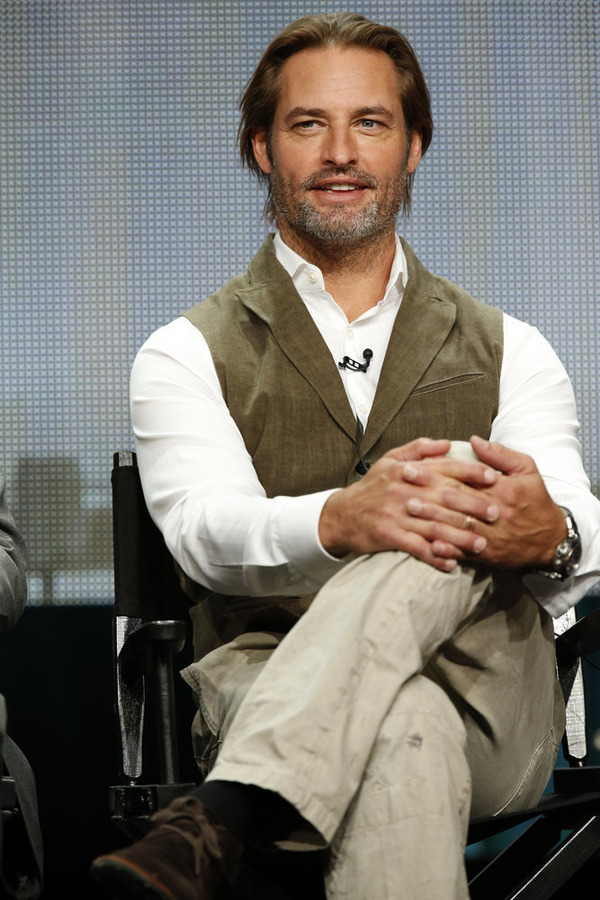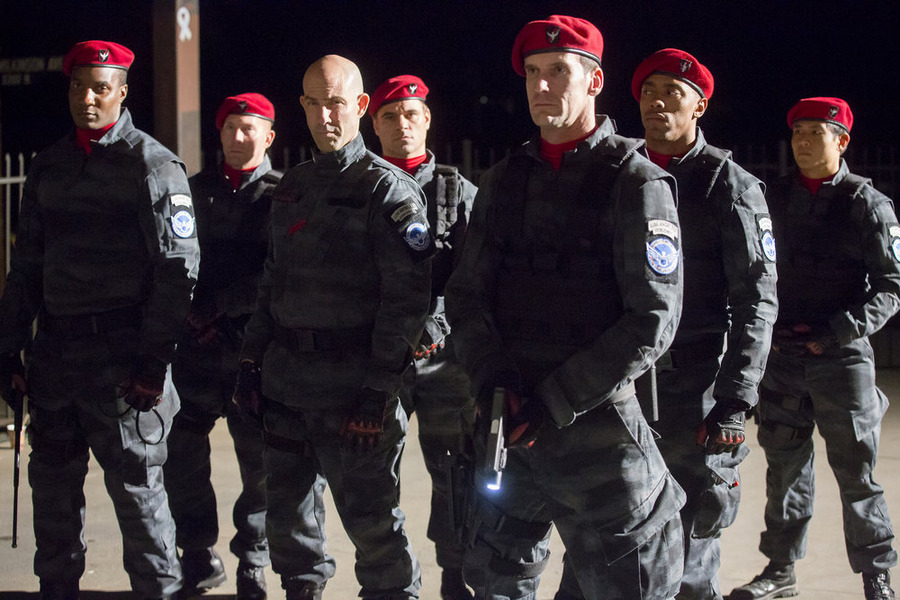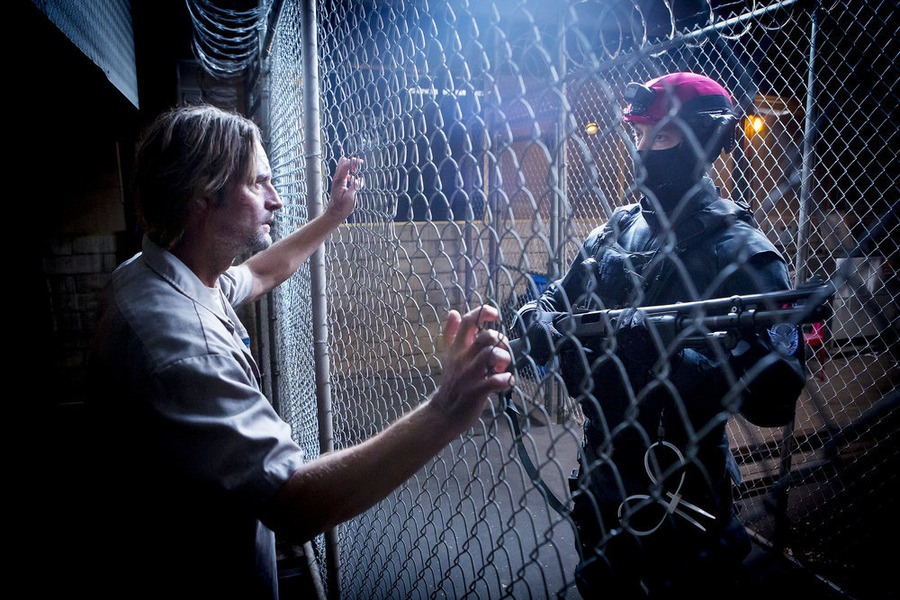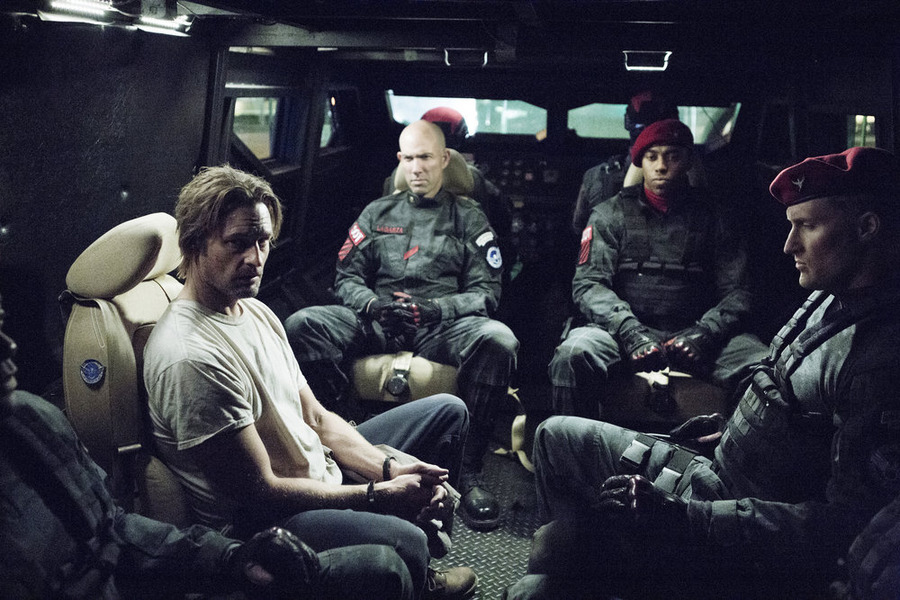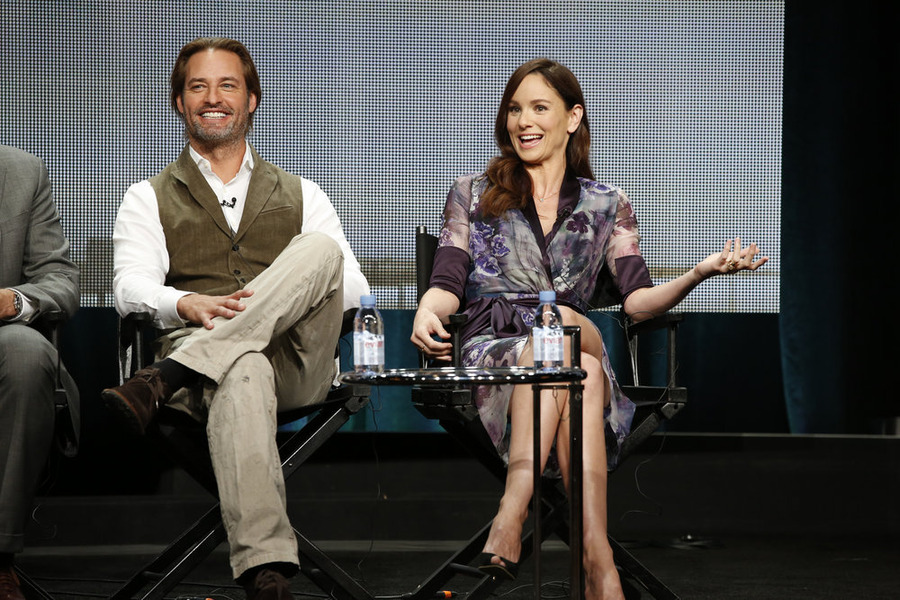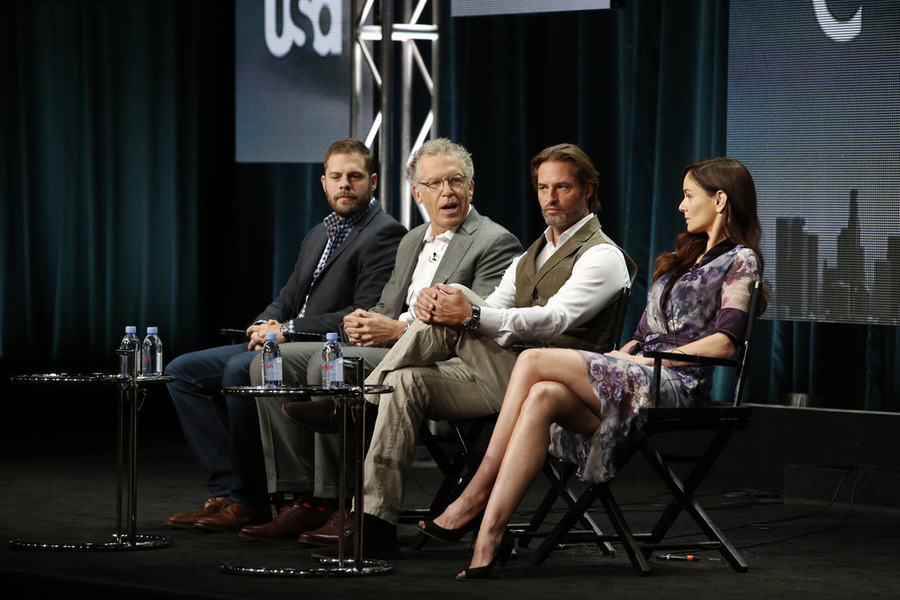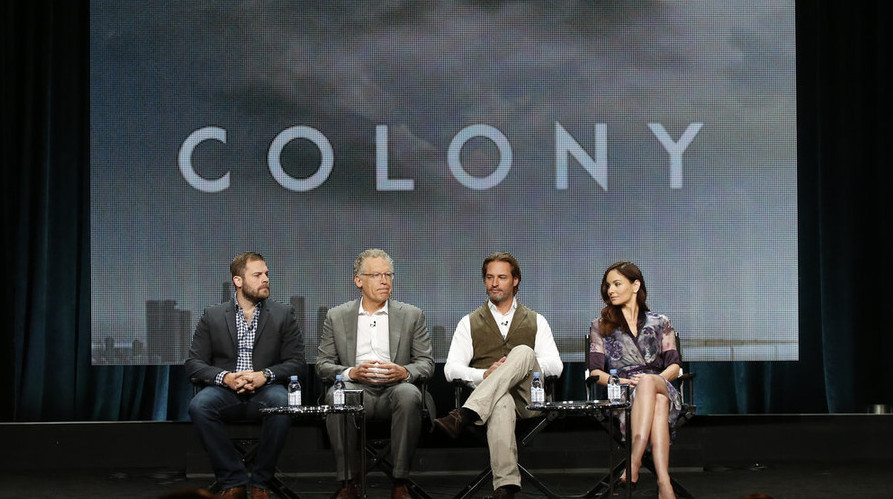
USA’s new quasi-futuristic drama Colony premieres Thursday, January 14th at 10p.m. following WWE Smackdown. Set in the near future, Colony shows a family’s “struggle to survive and bring liberty back to an occupied Los Angeles.” OHSOGRAY was on hand at NBC’s summer Television Critics Association presentation, the show’s executive producer/creator Ryan Condal and Carlton Cuse took the stage alongside stars Josh Holloway and Sarah Wayne Callies. Here’s what they had to say.
[For Sarah] do you feel that you’re running from one global catastrophe to another? Can you sort of contrast the types of desperation between this character and Lori [on The Walking Dead]?
Sarah Wayne Callies: Aren’t we all running from one global catastrophe to another? […] You know, I feel, actually, that in a way, this is the photonegative of the apocalyptic world that I just came from, which is to say that an apocalypse is about anarchy and about chaos and about the loss of control over people. Whereas an occupation is about a hyperorganized state that has absolute control over its people. And so, you know, whereas the threat that we were sort of running from on the other show was a little nameless and faceless and disorganized, on “Colony” what we’re facing is a hyperorganized adversary that we’ll never be able to outgun and we’ll never be able to sort of out intelligence. It’s a David and Goliath story, I think, in a real sense with “Colony,” if that answers your question.
[For Carlton] Is “Colony” a little less mysterious and ambiguous than other shows you’ve done, or are there more mysteries to come?
Carlton Cuse: […] There are definitely more mysteries to come. I mean, when Ryan and I were creating the show, we wanted to kind of keep the curtain right in front of the audience so you really don’t know anything more than what the characters know. There isn’t an explainer character, comes and lays out what’s happening in this world. So the mystery of what is this mysterious occupying force, what do they want, what exactly are they doing here, how are they operating, they’ve installed this proxy government that’s running the colony, and that’s what the show’s really about.
We really wanted to make sure that we weren’t doing another show in the sort of aliens-versus-humans genre. That’s not what the show’s about. It’s really about the experience of colonization. It’s a much closer metaphor to Afghanistan, for instance, where we put someone like Karzai in power, and then you have one group of people that are sort of in charge of another group of people, and the history of colonization is kind of the history of subjugation, and it’s really what the focus of our show’s about.
There is definitely a mystery element, because we’re trying to, as an audience, learn along with the characters of what exactly the new rules of this world are and what these people want and why they’re here and what’s outside the walls and what’s happening to the rest of the world, and those questions will get answered over time.
Are you actually shooting this one in Los Angeles?
Carlton Cuse: We are actually shooting in Los Angeles, which is fantastic. And we are very grateful to the legendary UCP and USA for letting that happen. Los Angeles is very much a character in our show. It’s a big part of it. We love the idea of not doing a kind of traditional post apocalyptic, dystopic world. Los Angeles has kind of some buildings that were blown out, like you saw in the trailer, the Federal Building, but there is a lot that still is the same. This is a world that has pluses and minuses. For Ryan and I, we are very influenced by images of Paris during Nazi occupation, and we looked at these photographs of people sitting in nice clothes and sidewalk cafes drinking espressos while Nazi storm troopers were going by, and the incongruity of trying to maintain the order of your life under this incredible oppression was something that really fascinated us, and we wanted to find a modern metaphor to tell that same type of story.
[For Josh and Sarah] Describe what it’s like, first of all, to be able to have a real job where you can actually go home every night to your real house. […]
Sarah Wayne Callies: I spent the last six years of my career shooting on location. It’s weird to be in L.A. and sort of have a more traditional job. You know, what you get when you’re on location is you don’t know anybody else. You get very close very quickly with people. And to be honest, I was nervous about that coming to Los Angeles, thinking, well, we’re going to kind of scatter to the winds on our off time. Are we going to be able to create the kind of company that I think really makes a great show?
And then I found out that I was cast opposite Josh, and Josh and I worked together ten years ago. We’ve known each other from right before, I think I don’t know if it was right before or right after you got married. Neither of us had kids, and it was a relief to discover I was working with a leading man who I have a long personal history with, because we have to form a marriage that has a long, long history. And then we’ve gotten to know these other people. You know, the woman who plays my sister, Amanda Righetti, is this sort of gorgeous, wonderful talented woman, and we’ve discovered that we like to go take our kids to the park, which is what we do in the show. So we sort of developed this sort of parallel life. It’s working out well. I’ll be honest. I’m probably not supposed to say this, but I was really nervous about L.A. I don’t live here. And it’s kind of a great city. News flash. L.A.’s great.
Josh Holloway: I’ve been loving it. To be in L.A., it’s become an exotic location. No one shoots here anymore, and now I’m proud to be on a show that is bringing drama back to L.A., and for our show, like Carlton said, it is a character in the show. It’s a melting pot. Every culture you can think of is here, and every culture has different shadows and how they deal with authority and what they might do. So there’s such a diversity in story that you can expand on here, and it is amazing to come home to my family. I have two small children, a year and a half year old boy and a six year old girl, and to come home and be reminded of the stakes that I’m playing every day at work is gold as an actor. I mean, I have to constantly protect my family, find a way to protect my family in this show, and I come home and they’re there, and I’m like, “Yeah, they’re okay.” And that is just fuel. It’s gold, because we care about things that make us happy, and their happiness is such a contrast of going to work and having to fight for that. So it’s fantastic. I love it.
We’ve been told not to call the series an alien invasion. Can you talk a little bit about why you didn’t want to concentrate so much on that aspect of it?
Carlton Cuse: I think Ryan and I felt like that show had been done, and we wanted to we love the idea of basically telling kind of this espionage the story of colonization, it’s really an espionage thriller with a sort of sci fi backdrop, and we didn’t want do another version of “V” or “Falling Skies.” There have been a lot of wonderful shows that have tackled that topic head-on. And that really is not what this is about. We sort of felt like if you look at the history of the world, almost every country has either been a colony or a colonizer, and that experience of the kind of social dynamic of one group of people sort of having absolute power over another group of people was something we wanted to explore, and that was really what our thematic interest was in, and we wanted to find a contemporary way to do that, and also I love kind of cross genre storytelling, so the idea that we could do that — we would have drones and these 300 foot high metallic walls that would surround Los Angeles and sort of the spectra of this mysterious occupying force out there — was something that just felt like it added to the storytelling, but we didn’t want that to be the focus of the storytelling.
[For Josh] Because it seems as though, in watching the pilot, that Los Angeles surrounded by this fence around it, just trying to keep everyone there with the controlling force and you’re trying to get out, how does it feel trying to get off the island again?
Josh Holloway: Well, it’s a little different in that in my other show, […] he would live for himself pretty much. He came from a different end of the spectrum. In this, I’m not trying to get off the island or out. I’m trying to get to my son. I’m trying to get him and get back to the family and reunite our family and ultimately to find a way to help the human race. But in my character’s eyes, family is first and he has to reunite his family and then save the human race, so it’s that. He’s getting to that to get something and come back, and also to learn what is over there.
In the tradition of working with Carlton Cuse, I don’t know anything that’s going on, and it’s a wonderful discovery to what’s on the other side of that wall and what’s on the other side of the wall where it’s burned out. It’s separated into prison blocks, kind of, if you will, Los Angeles. And we don’t know if the world is separated in that way either. All communications have been cut off. We don’t know if there’s a New York or anything right now. So everything is a discovery, I think.
[For Carlton] In the pilot, there were no hints that there are other colonies other than what’s happening in Los Angeles, can you tease us just slightly about what’s over the wall and are there other colonies?
Carlton Cuse: Well, the Los Angeles colony is made up of three blocks. There’s the Los Angeles block which is where our show takes place. There’s the Santa Monica block. And there’s the San Fernando Valley block. The Valley did survive.
Which is an important narrative point. If you look into downtown Los Angeles, the buildings are still standing, but there’s not a soul there. If you were to look south of Los Angeles, it’s also sort of a barren wasteland except for this launching pad where these spaceships are flying up and down. We don’t know what they’re doing or where they’re going or why they’re flying up or down.
So that is the world that our characters and you kind of visibly see. Over the course of the first season, we’ll learn a little bit more about are there other cities, what’s happened to the rest of the world. That will be teased out across the first season.
[For Ryan and Carlton] [W]hat went into the decision to have us kind of come in midstream where the invasion or whatever it is has already happened?
Ryan Condal: Thank you for the question. I mean, I think the world that Carlton and I were very interested in exploring creatively was that world of Nazi occupied Europe. And we’ve seen tons of war movies about the invasion and “Saving Private Ryan,” taking the beach at Normandy. But for us, I think the kind of creative gold mine was what happens after. And as Paris very quickly kind of went back to, quote/unquote, normal life as Carlton described, the images of the city that really inspired us early on when we were writing the pilot, what happens when it’s not soldiers anymore. It’s not an army versus an army. What happens when you take these people who have lived in this place their whole lives and now you’ve forced them to make a decision? Are you going to collaborate? Are you going to resist? Are you going to just try to go right down the middle and just try to hide and keep your head down and not get noticed, which was actually the case for most people that were occupied by Nazis? That was the world that we were fascinated with because then you take, quote/unquote, normal people like Will and Katie and a bunch of the other characters in the pilot and you challenge them and you put them into this survival situation where Maddie has to she has a sick child who needs insulin because he’s a diabetic. And in our in the world that she came from, that was something that she didn’t even think about. It was just a fact of life, and now it’s suddenly this really heightened survival situation, and that was what we were fascinated with.
I mean, Juan Campanella, who directed the pilot, the Oscar winning director of “Secret in Their Eyes,” grew up in dictatorial Argentina in the ’70s and came on and told us all these great stories about living during that time and living under this totalitarian society. And they didn’t have a curfew there, but the DP on pilot grew up in Peru where they did have a curfew, so we got all these great stories from there. But, yeah, he went to film school and they were all seen as radicals. So he had gone through checkpoints and he had survived that, being taken out of a car and had a gun barrel put to the back of his head while their car was searched and tossed. And he said afterwards they just got back into the car and drove on and kept talking about “Taxi Driver,” because it was the movie that was in theaters. And it was just a fact of life to them. So those were normal, regular people and those stories are what we’re really fascinated in telling. And we feel like that’s the new way into this kind of subgenre of the invasion story.
[For Ryan and Josh]: [I]n this show … every villain we see is a collaborator. […] Is that on purpose?
Josh Holloway: Well, a recent study to show you the brutality of a human being, remember the Stanford experiment? Take bright students from a college, put them in a prison situation. Half are prison guards. Half are prisoners. And they had to stop the experiment after two weeks because it was so brutal and so despairing to the other side.
And so are we capable of this? Absolutely we’re capable of this. And we’ve done it to each other since the beginning of time. But the storytelling, I love the writing of this because it’s patient. It’s patient and the story unfolds. So, yes, you see this side, and, yes, you’ll see the other side, so.
Ryan Condal: To continue on, that’s a great answer. I think from a storytelling perspective what fascinated Carlton and I, everybody knew the Nazis were evil, right? But the villains that fascinated us were the Vichy French, the people that lived in this place and very quickly surrendered all nationalism and loyalty to their own people in order to collaborate with the enemy to either keep themselves safe and their families safe or to gain and to gain power and influence they did not have before.
I mean, in our world, and this is something that we kind of reveal as the story unfolds, is that all military law enforcement, the entire command and control structure was taken out as a part of the arrival, the event that’s mentioned in the pilot and the trailer. And what’s left is this entire class of people that have now been elevated up into this position, and it’s like, well, we’re going to give you all these things that you didn’t have before and you’re going to owe us. But, in exchange, you have to keep control over this block and you’re responsible for that and we’re going to leave this with you. You’re the proxy government. You take care of this.
And we were fascinated with the idea that how quickly humans will sell each other out to gain a little something more, a better house, protection for your family. I mean, even humanizing it, just people that did this so that they could take care of their loved ones. And that everybody knew the Nazis were bad. They’ve been villains for 7 years in entertainment. But the true villains for us in this case are the humans that have decided to turn against their own kind, and that makes for fascinating storytelling.
Can you talk about the style of the show and the look of it?
Carlton Cuse: Again, in collaboration with Juan Campanella, our fantastic Academy Award winning director from Argentina, we created a visual style that was meant to be sort of a vérité. He had made documentaries, as had Checco, our Peruvian DP. And I think we wanted a style that really made the show feel visceral and feel very the sense of verisimilitude. We also didn’t, as I said before, want Los Angeles to be this kind of dystopic world where every like “Blade Runner” where everything was awful. So there’s this mix of beauty and tragedy, which, I think, is kind of a reflection of how things really would be.There’s this [….]
So Los Angeles, in certain ways, what’s weird is there’s a certain aspirational quality. I mean, in this colony, you’re relatively safe. You could take a bus from one side to the other in like nine minutes. There is very little street crime. There is an immense amount of social order. But at the same time, people are living under horrible oppression. Any small kind of way in which you step out of line can lead you to be sent off to this mysterious factory. So the rules of society have been upended, and we like the incongruity of trying to kind of show that visually, show a world that was both sort of beautiful and also terrifying, and that was kind of the idea.
You have talked about this a little, about using allegory to tell the story. Do you feel like that gives it a more authentic […] storytelling venue for you?
Sarah Wayne Callies: Well, but that’s what science fiction does, right?
Carlton Cuse: Yeah.
Sarah Wayne Callies: I mean, not that I know that the sci fi aliens — but to the extent that they’re aspects of this show can consciously recall the great traditions of science fiction, right? If you think about the first season of “Battlestar Galactica,” which I thought was brilliant, it was a, I don’t know, 10 or 13 hour treatise on the Patriot Act right? and on whether or not we’re willing to sacrifice certain things in order to feel safe.
I think, likewise, what I love about and we’re in the process of shooting 5 and 6 right now, which, I think, are really kind of brilliant and amazing, and what I love about the discussion and the questions that are being raised in these episodes is they take the idea of we’ve got the good guys and we’ve got the bad guys and they destroy them. And you realize that you’ve got all of these zealots who are trying to fight back and sort of “viva la resistance,” and they don’t know thing one about really what they’re doing.
And so passion and zealotry can be as dangerous as an occupying force. And you’ve got all of these people in the occupation who are making incredibly cogent arguments about we’re preserving human culture so that we can live in peace and all these things just the way the Vichy government said we’re preserving Paris and they did.
So I think what’s exciting is this element of the proxy stories that you get to tell, the undercurrents that you’re allowed to explore with science fiction that would be a little too on the nose and maybe would feel a little too much like CNN if you just put the story right out there. I don’t know that people want to watch a show about Afghanistan right now. It hurts. It’s scary. We’re raw. But we can tell a story about an occupied people and what’s the genesis of the resistance, right? How far do you have to push people down before they’ll stand up and go I don’t care if this kills me. I’m done. I’m done. I’m going to stand up. And when is that an act of nobility? And when is it an act of idiocy? I think those are really interesting questions to ask, and the aliens let us ask them.
Josh Holloway: And who would you put first, humanity or your child? Are you going to let them die? Are they going to be taken and burned or killed or shot because you’re standing up for […]
Sarah Wayne Callies: Or brainwashed.
Josh Holloway: Or brainwashed because you’re standing up for humanity? I don’t know. That’s a big question.
[For Carlton and Ryan] What are we meant to extrapolate about the aliens based on what they are dictating to the collaborators?
Ryan Condal: I mean, Carlton won’t tell me, so I’m going to let him answer.
Carlton Cuse: I mean, that obviously is kind of a series long mystery, so I can’t answer that question other than to say they’re smart in that as opposed to it’s the same again, kind of looking at the parallels of recent occupations, it makes sense that they would come in and they would install a proxy government of humans to take care of the other humans as opposed to trying to rule them themselves, in the same way that we would go into Afghanistan and Iraq and our goal is to try to put a local government in place that would be capable of governing this society, but, at the same time, one that was loyal to and responsive to our needs. So that’s kind of I think that’s kind of all we know, really, at the beginning of a story, and over time we’ll come to figure out what their greater purpose is in being here.
Wouldn’t we extrapolate that they must have some frailty and that they just don’t jump on the ground go, hey, we want this, we’re taking it?
Ryan Condal: I mean, I think that’s actually one of the great things about our show, is that typically in these kinds of stories, these science-fiction invasion stories, you end up with this kind of hive mind of the people that are they’re all coming here to take our planet or to eat us or whatever. And I think what we’ll learn is that, just as Sarah was talking about, this world being very gray, the idea here is that not necessarily the occupiers are not necessarily all looking for the same thing, and there might be disagreements amongst them as to what is actually the right approach here. So just in allegory to our current situations in the Middle East, I think there are a lot of different opinions about whether we should be there in the first place. And if we are there, should we be stronger or […]
Carlton Cuse: Building schools.
Ryan Condal: Right, exactly. And that’s science fiction to me, is exploring real ideas, real themes from our society in a new way that makes it palatable. And it’s the spoonful of sugar to help the medicine go down.
[For Josh and Sarah] What are the physical demands of this show?
Sarah Wayne Callies: I can answer that question by telling you that it took a makeup artist 20 minutes to make my legs not look like I’m a battered woman. Literally, I put this dress on. She goes, oh, God, and she just started fixing me up. [Laughter.] How many injuries do you have?
Josh Holloway: I don’t know. I love it, though. I mean, I don’t feel connected till I’m bleeding or something, so I’m like, woo, okay, ramp it up. So for me, I could use a little more.
Sarah Wayne Callies: Easy, easy.
Josh Holloway: I love it. I love it because it’s not action for action’s sake. This is a character driven…
Sarah Wayne Callies: Yeah.
Josh Holloway: …human story about relationships and the deep choices and hard moral choices we have to make, and there’s action. So it’s great. I hate a movie that just wears me out or a show that just wears me out for the sake of action. And that is not this. There’s more tension than action, I would say.
Sarah Wayne Callies: We also come at it from very different histories, which is to say he was an Army ranger. He was in the FBI. He’s got a ton of training and he knows what he’s doing. Whereas, the situations that I find myself in are brand new to me and I don’t know how to get out of them and I’m in over my head. So I think the action sequences are very the sort of his and hers of it are very what I’m saying is he looks cooler and I’m constantly like…
Josh Holloway: Not true.
Sarah Wayne Callies: …fumbling around, trying not to bump into the furniture and failing.
Josh Holloway: No, it’s fantastic.
(Photos Courtesy NBC)
